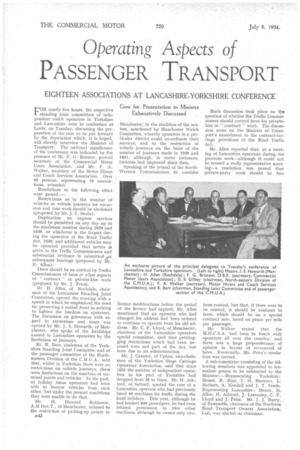Operating Aspects of
Page 60

If you've noticed an error in this article please click here to report it so we can fix it.
PASSENGER TRANSPORT
EIGHTEEN ASSOCIATIONS AT LANCASHIRE-YORKSHIRE CONFERENCE
Case for Presentation to Minister Exhaustively Discussed FOR nearly five hours, the respective standing joint committees of independent coach operators in Yorkshire and Lancashire were in conference at Leeds, on Tuesday, discussing the preparation of the case to be put forward by the deputation which, it is hoped, will shortly interview the Minister of Transport. The national significance of the conference was indicated by the presence of Mr. F. G. Bristow, general secretary of the Commercial Motor Users Association, and Mr. F. A. Walker, secretary of the Motor Hirers and Coach Services Association, Over 40 persons, representing 18 associations, attended.
Resolutions to the following effect were passed :— Restrictions as to the number of vehicles or vehicle journeys for excursion and tour work should be abolished (proposed by Mr. J. T. Steele).
Duplication on express services should be permitted on any day up to the maximum number during 1929 and 1930, or whichever is the largest during the operation of the Road Traffic Act, 1930, and additional vehicles may be operated provided that notice is given to the Traffic Commissioners and substantial evidence is submitted ,a.t subsequent hearings (proposed by Mr. H. Allen).
There should be no control by Traffic Commissioners of fares or other aspects of " contract" or private-hire work (proposed by Mr. J. Price).
Mr. H. Allen, of Rochdale, chairman of the Lancashire Standing Joint Committee, opened the meeting with a speech in which he emphasized the need for presenting a united front in seeking to lighten the burdens on operators. The discussion on grievances with regard to excursions and tours was opened by Mr. J. S. Howarth, of Manchester, who spoke of the hardships caused to Lancashire operators by the limitation of journeys.
Mr. R. Barr, chairman of the Yorkshire Standing Joint Committee and of the passenger committee of the Northeastern Division of the C.M.U.A., said that, whilst in Yorkshire there were no restrictions on vehicle journeys, there were limitations on the numbers of terminal points and vehicles. In the past, at holiday times operators had been able to borrow vehicles from each other, but under the present conditions they were unable to do that.
Mr. H. Howard Robinson, A.M.Inst.T., of Manchester, referred to the restriction of picking-up points in Manchester; to the abolition of the system, sanctioned by Manchester Watch Committee, whereby operators in a particular district could co-ordinate their services; and to the restriction of vehicle journeys on the basis of the number of journeys made in 1930 and 1931, although, in many instances, business had improved since then.
, Speaking of the refusal of the NorthWestern Commissioners to consider licence modifications before the period of the licence had expired, Mr. Allen mentioned that an operator who had changed his address had been ordered to continue to operate from his old address. Mr. C. F. Lloyd, of Manchester, chairman of the Lancashire operators special committee, said that pettifogging restrictions which had been imposed were not part of the Act, but were due to its administration.
Mr. J. Granter, of Upton, vice-chairman of the Yorkshire Stage Carriage Operators Association, said that since 1931 the number of independent operators in his part of Yorkshire had dropped from 35 to three. Mr. H. Ashford, of Salford, quoted the case of a Lancashire operator who had previously hired 40 machines for traffic during the local holidays. This year, although he had booked 800 passengers, he had been refused permission to hire other machines, although he owned only two. Much discussion took place on the question of whether the Traffic Commissioners should control fares for privatehire or " contract " work. The discussion arose on the Minister of Transport's amendment to the contract-carriage provisions of the Road Traffic Act.
Mr. Allen reported that, at a meeting of Lancashire operators during the previous week—although it could not be termed a really representative meeting—a resolution was passed that private-party work should be free
from control, but that, if there were to be control, it should be confined to fares, which should be on a special contract rate, based on pence per mile per passenger.
Mr. Walker stated that the M.H.C.S.A. had been in touch with operators all over the country, and there was a large preponderance of opinion in favour of no-control of fares. Eventually, Mr. Price's resolution was carried.
A sub-committee consisting of the following members was appointed to formulate points to be submitted to the
Minister :—Representing Yorkshire: Messrs. R. Barr, T. H. Burrows, L. Mathers, A. Kendall and J. T. Steele. Representing Lancashire: Messrs. H. Allen, H. Ashford, J. Leavesley, C. F. Lloyd and J, Price. Mr. J. J. Barry, of Newcastle, chairman of the Northern Road Transport Owners Association, Ltd., was elected as chairman.




































































































